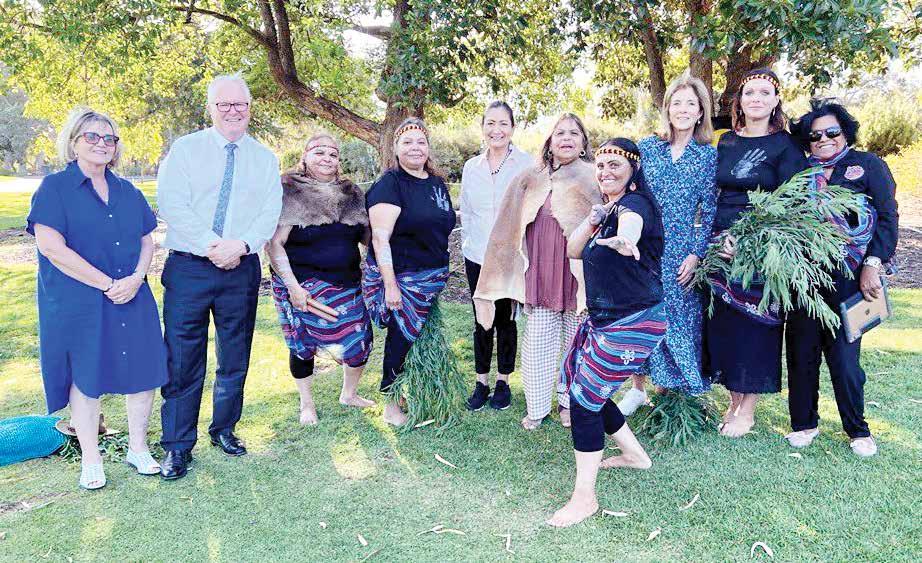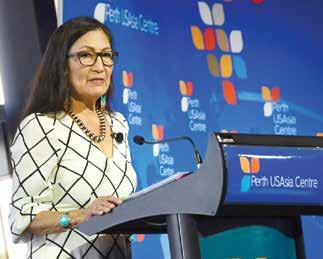
4 minute read
Indigenous Knowledge ‘essential’ to global future
United States Secretary of the Interior Deb Haaland – the first Native American to serve as a US cabinet secretary – visited Perth last week, where she spoke at an event hosted by the Perth USAsia Centre on the importance of Indigenous-led conservation and co-stewardship partnerships as key tools for addressing the climate and biodiversity crises.
She said the lifethreatening impacts of the climate crisis were being felt in communities across the world – from severe drought and wildfires to devastating flooding and crop shortages.
Secretary Haaland said identifying global solutions and incorporating Indigenous Knowledge was essential for protecting public health, safeguarding national security, and ensuring a livable planet for future generations to inherit.

“I am so thrilled to be here in Perth and visiting this beautiful country,” she said.
“Like many Indigenous communities around the world, much of my identity reflects the land my people come from.
“Over millennia, my ancestors used traditional knowledge and practices that were passed down through generations of people who learned to survive and thrive in the high desert landscape.”
She said her ancestors knew their origins back to the 1200s.
“My ancestors used their knowledge to manage and escape drought, to feed their families, to care for the earth, and to coexist with the land, water, and wildlife that sustained them,” she said.
“I think it’s fair to say that, even to this day, no one knows my homelands better than its original stewards and their descendants.”
She said she had been taught the land and its offerings were gifts, never to be taken for granted.
“As Secretary of the Interior, I lead the federal agency tasked with – in many ways – stewarding the United States’ direct relationship with the earth,” she said.
“The Department oversees 480 million acres of U.S. public lands, which is over two thirds the size of
Western Australia.
“Along with federal waters, the Department oversees the energy development, conservation, and wildlife management policies that impact these vast and irreplaceable spaces.
“Additionally, we uphold what we refer to as the federal government’s nationto-nation relationship and treaty responsibilities with 574 sovereign Tribal Nations – the equivalent of First Nations here in Australia.
“At one point in time, the Department I now lead was tasked with either exterminating or assimilating Indigenous people like me – a painful history that our two countries intimately share.
“I am the first Cabinet Secretary who brings the trauma of surviving federal assimilation policies to the decision-making table.
“As Secretary, I stand on the shoulders of those who came before me who survived those painful pages of our history so that I could be here today.”
Secretary Haaland said both our countries had experienced the effects of climate change.
“With so much responsibility for the health and well-being of the land and people, our Department is well-positioned to help address the greatest challenge of our lifetime: the climate crisis,” she said.
“But to do that, we must work across the globe to find collaborative solutions.
“Intensifying wildfires, historic droughts, disastrous flooding and disappearing wildlife threaten the futures and national security of every country on earth.
“Our countries are both
Many inherent ecological benefits is essential to reaching our climate goals.
“For centuries, Tribes have been excluded from the management of the ancestral homelands they were removed from.
“Together, we are changing this reality.”
United States Secretary of the Interior Deb Haaland. Pics supplied.
experiencing the devastating impacts of a rapidly changing climate – and have already created a model of collaboration to meet the challenge head on.”
She said they hoped, over the next decade, to reduce net greenhouse gas emissions by just over 50 per cent, and to restore and conserve public land and waters to help meet their climate goals.
“To help meet this goal, the United States is leveraging an essential – yet globally underutilised – tool to address our interlocking climate and biodiversity crises: Indigenous-led conservation and costewardship partnerships,” she said. “I am here to tell you that not only is this work possible – it is necessary.
“And it’s already happening across the United States alongside dozens of sovereign Tribal Nations.
“Through Indigenousled conservation and co-stewardship initiatives, the United States is creating opportunities for the original stewards of our country’s lands and waters to participate in how they are managed.
“What is critical here is that we are putting words into action.
“And the exciting part is that much of what we are doing can be replicated for a more equitable and climateresilient future worldwide.”
She said they had signed several co-management agreements across the country.
“As many of you know, the United States holds a vast network of public lands and waters,” she said.
“Conserving these iconic landscapes and their
Secretary Haaland said those agreements provided a path to apply the knowledge and conservation strategies they developed over generations.
“This irreplaceable guidance will benefit us all,” she said.
“Centering Indigenous Knowledge also means empowering Indigenous communities, supporting their subsistence lifestyles, and honoring the trust responsibility the federal government has to sovereign Tribal Nations.”
She said 20 such agreements had already been signed, and there were 60 more in progress.
“But the United States is not acting alone,” she said.
“Australia is also making important headway toward this shared goal.
“Just as my ancestors cared for their lands, Aboriginal and Torres Strait Islander people have cared for the land that sustains communities across this country.
“Here in Australia, members of the Queensland Indigenous Women’s Ranger Network are leveraging Indigenous Knowledge gained over tens of thousands of years to protect iconic and threatened ecosystems like the Great Barrier Reef.
“By merging Indigenous Knowledge of the environment with modern tools like drones, the Indigenous rangers take a holistic approach to protecting the reef by monitoring coral change, forest fires, and land degradation that threatens imperiled species.
“Last year, these Traditional Custodians were awarded the 2022 Earthshot Prize for their work to protect this culturally and spiritually significant region.
“This prestigious award is recognised across the globe.








